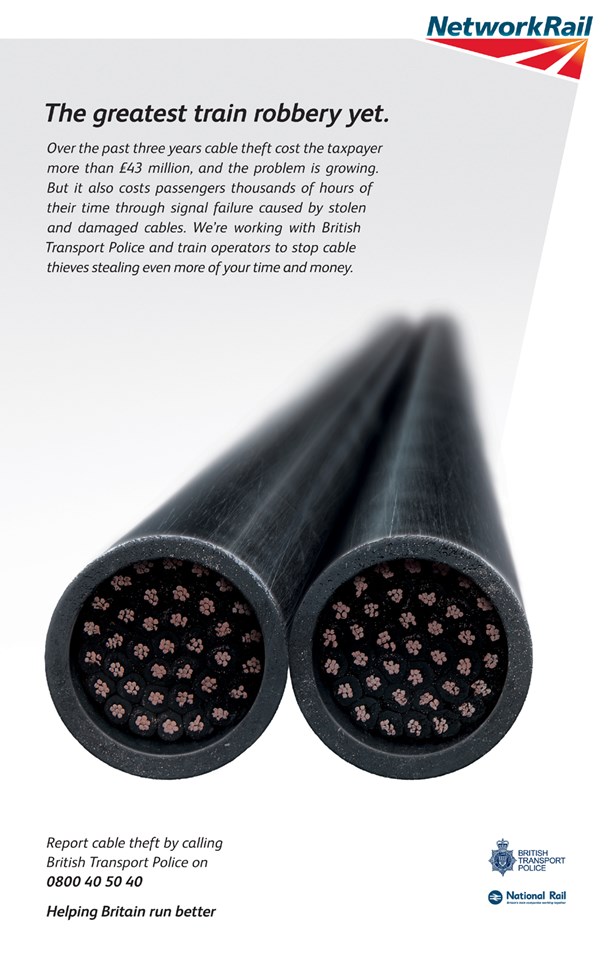Monday 30 Apr 2012
NETWORK RAIL GIVES SUPPORT FOR SCRAP LEGISLATIVE REFORM AS CABLE THEFT FALLS BUT PASSENGER MISERY CONTINUES IN WALES
- Region & Route:
- | Wales & Western: Wales & Borders
- | Wales & Western
- Crimes in Wales down 37% on previous year
- Disruption to passengers in Wales more than 36,000mins
- Full legislative reform believed to be only way to stem the tide
Efforts by the rail industry to stop the cost and misery caused by cable thieves in Wales are having an impact Network Rail reveals today.
Crimes for the financial year 2011/12 are down 37% to 53 incidents from 84 the previous year, with majority of these crimes committed in south Wales. These incidents cost the industry, and ultimately the taxpayer and country, more than half a million in the last 12 months.
Mark Langman, route managing director for Network Rail Wales said: “Our massive effort against cable thieves is having effect. Crimes and delay to passengers are both down on last year. However they are still at an unacceptably high level. We firmly believe that without legal reform we will continue to see thousands of hours delay and millions of pounds dealing with these crimes.”
The government has indicated that cash transactions for scrap will be outlawed. However Network Rail and the wider rail industry are united in calling for full reform of the 1964 Scrap Metal Dealers Act. This needs to include:
- an updated, fully funded licensing scheme to replace the voluntary registration currently in place.
- magistrates should also have the power to impose restrictions upon, and ultimately enforce the closure of, yards that fail to keep to the law.
- police powers to enter, inspect and if necessary close scrap dealers are essential. At present they may only enter registered premises with a warrant.
- a requirement for scrap metal dealers to require proof of identity and to keep adequate records about their customers.
- Additional requirements on itinerant metal dealers’ vehicle licences to enable those operating outside the law to be impounded.
Network Rail has invested millions of pounds protecting key locations and funding extra British Transport Police officers. This has combined with public support in reporting criminals and improved sentencing in courts.
Mr Langman added, “We are grateful for the public support we continue to receive in reporting suspicious activity – both on the railway and at disreputable scrap dealers. We will continue to do all we can to stop these thieves but it is clear the law needs substantial change in order to take away the easy market for illegal scrap.”
Gary Cooper, head of operations at the Association of Train Operating Companies, said: “Cable theft regularly causes disruption for thousands of passengers and costs the taxpayer millions, so it is good news that the government is taking action to crack down on illegal scrap metal dealing.
“Train companies are working closely with the rest of the industry to tackle the problem, and this is an important step in helping us to succeed. But further changes to the law now need to be made to create a robust new licensing regime covering all scrap yards, giving police and councils the power to search and investigate them, and to close down any dealers involved in theft."
Tony Berkeley, chairman of the Rail Freight Group said “Cable theft continues to cause major delay to freight trains on a daily basis. Although this doesn’t often hit the headlines in the way that passenger delays do, it is causing significant problems for freight operators and their customers who include national retailers, power generators and construction companies. The cost of disruption is significant and impacts on their businesses, their employees, and ultimately the whole UK economy.
“We are pleased that UK Government has taken the first steps in tackling cable theft, alongside the continued efforts of the rail industry. But further action will be required if the impacts of cable theft are to be eliminated.”
Assistant chief constable Alan Pacey, of British Transport Police, added: “BTP is committed to tackling metal theft, particularly those thefts which have a direct impact on the running of the railway.
“We have officers dedicated to dealing with metal theft and, during 2011, arrested more than 1,000 people in connection with these crimes. In the past few months convicted metal thieves have been jailed for a total of more than 58 years thanks to British Transport Police investigations.
“We will continue to disrupt and detect thieves who target the railway and will not hesitate to put them before the courts and seek the strongest possible sanctions.”
Contact information
Passengers / community members
Network Rail national helpline
03457 11 41 41
Latest travel advice
Please visit National Rail Enquiries
Journalists
Network Rail press office -Western route
MediaRelationsWestern@networkrail.co.uk
About Network Rail
We own, operate and develop Britain's railway infrastructure; that's 20,000 miles of track, 30,000 bridges, tunnels and viaducts and the thousands of signals, level crossings and stations. We run 20 of the UK's largest stations while all the others, over 2,500, are run by the country's train operating companies.
Usually, there are almost five million journeys made in the UK and over 600 freight trains run on the network. People depend on Britain's railway for their daily commute, to visit friends and loved ones and to get them home safe every day. Our role is to deliver a safe and reliable railway, so we carefully manage and deliver thousands of projects every year that form part of the multi-billion pound Railway Upgrade Plan, to grow and expand the nation's railway network to respond to the tremendous growth and demand the railway has experienced - a doubling of passenger journeys over the past 20 years.
Follow us on Twitter: @networkrail
Visit our online newsroom: www.networkrailmediacentre.co.uk

